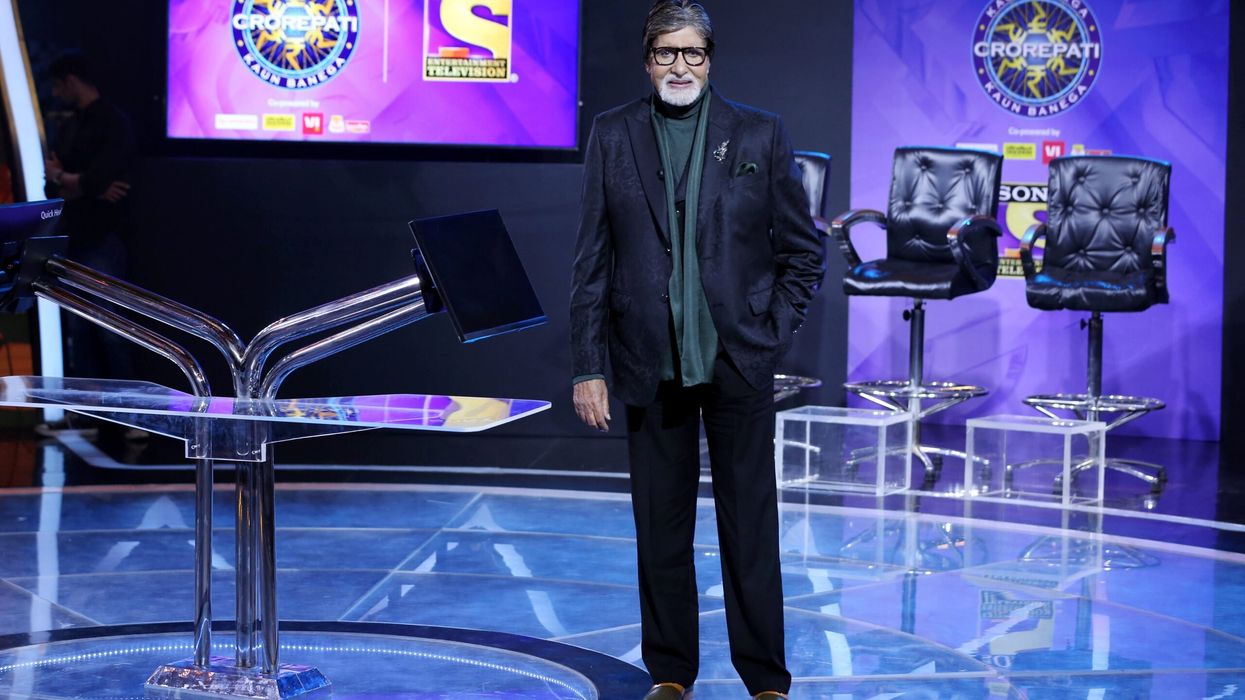WHILE the 2000 film Mohabbatein revitalised Amitabh Bachchan’s film career, it was Kaun Banega Crorepati (KBC) that transformed the legendary actor’s fortunes overnight.
Far from being just another televised quiz show, the Indian version of Who Wants to Be a Millionaire? became an enduring brand, thanks to its megastar host. It bridged the gap between television and Hindi cinema, inspired the acclaimed novel Q&A, and influenced the Oscar-winning film Slumdog Millionaire. The show also changed lives, delivered iconic catchphrases, and brought families together. Now, 24 years later, KBC continues to thrive in its sixteenth season.
Eastern Eye celebrates Kaun Banega Crorepati’s legacy, its impact, and how Amitabh Bachchan, the king of the big screen, became the undisputed ruler of the small screen.
Amitabh Bachchan: Just as he changed the face of Indian cinema in the 1970s, the Big B revolutionised television nearly 30 years later by hosting KBC. His stylish presence, magnetic charm, and unmatched spontaneity elevated the show to iconic status. Even when Shah Rukh Khan hosted season three in 2007 during Bachchan’s health issues, ratings dropped significantly until the Big B returned in 2010.
Family-friendly: The primetime show has always thrived on content suitable for all ages. Its clean, engaging entertainment connects with a cross-generational audience like no other show. The quizzical nature of KBC makes it both educational and informative. Host Amitabh Bachchan speaks fluently in chaste Hindi, frequently imparting wisdom and condemning profanity. He concludes each episode with uplifting or thought-provoking messages that reinforce strong family values.
Celebrities: Almost every A-list Bollywood actor, as well as prominent sports personalities and dignitaries, has appeared as a guest on the show. Whether promoting films, encouraging health and fitness, or raising awareness about important issues, these high-profile names add star power. Their camaraderie with Amitabh Bachchan boosts the entertainment value, and their prize money is always donated to charitable causes.
Children: Amitabh Bachchan recognises the importance of empowering future generations. He has hosted special episodes dedicated to children, with young contestants in the hot seat and an all-kid audience cheering them on. Beyond giving them centre stage, Bachchan dresses casually and interacts with them in a playful and engaging manner. He inspires them to pursue their dreams and build a brighter future for themselves and their country.
Life-changing: With most participants coming from humble or disadvantaged backgrounds, KBC provides opportunities otherwise out of reach. For many, even winning a small amount is life-changing. While the question “What will you do with your winnings?” on Who Wants to Be a Millionaire? often elicits answers like “holiday,” “new car,” or “bigger house,” on KBC, it is more commonly met with “educate my brother,” “clear my father’s loan,” or “pay for my mother’s operation.” KBC not only runs longer than other versions but airs more frequently, transforming more lives in the process.
Traditions: KBC airs during the festive season, with Navratri and Diwali being the most prominent and vibrant occasions. The set is illuminated with lamps, adorned with flowers, and decorated with themed elements. Traditional songs and folk dances immerse viewers and audiences in the celebrations. Amitabh Bachchan also embraces the spirit by swapping his signature English suits for traditional Indian attire. His birthday on October 11 also coincides with this period, marked by a special episode featuring retro performances and personal and professional stories from the actor.
Magic moments: Amitabh Bachchan’s trademark humility and wit have created countless memorable episodes over the years. Contestants with quirky personalities, unique stories, or impressive capabilities have often left him amused, emotionally moved, or awestruck. Other highlights include Bachchan reciting his father Dr Harivanshrai Bachchan’s poetry, sharing nostalgic moments, and adding humour through practical jokes and offbeat performances. One standout moment was his doublerole cameo as Lallan Bihari in season seven.
Surpasses original: While inspiration from Hollywood isn’t new to India, Kaun Banega Crorepati has far outshone its source, Who Wants to Be a Millionaire? Changes in the format and continuous evolution have brought KBC greater success, higher ratings, more entertainment value, and unmatched longevity compared to its western counterpart. Its multilayered approach adds depth, from Bachchan’s interactive conversations with the computer to his iconic catchphrases and unparalleled hosting skills, making the Indian version a clear winner.
Inspiring: Each episode begins with Amitabh Bachchan energising viewers and the audience as he runs onto the set. At 82, he continues to inspire with his profound messages while hosting the show. The superstar also encourages contestants to share their motivational stories and journeys to the hot seat, offering the nation moments of inspiration. These real-life narratives even inspired the Oscar-winning 2008 film Slumdog Millionaire.
Spin-offs: The immense success of KBC has inspired versions in various Indian languages, including Bengali, Tamil, Marathi, Kannada, Malayalam, and Telugu. These adaptations have entertained diverse audiences while providing opportunities for people to win lifechanging amounts of money, further highlighting the Hindi show’s monumental impact.
Catchphrases: The show has delivered iconic lines that have become part of popular culture, thanks to Amitabh Bachchan’s smooth delivery. The most memorable is “lock kiya jaye?” (shall we lock the answer?), which the host uses when a contestant finalises their answer.
Big (B) jackpot: While contestants come to KBC hoping to change their fortune, for many, the true prize is meeting Bachchan. Beyond his on-screen interactions, he engages with the audience during filming breaks and off-camera moments. He ensures every audience member gets a photo opportunity at the end of each episode, making everyone feel like a winner on Kaun Banega Crorepati.




